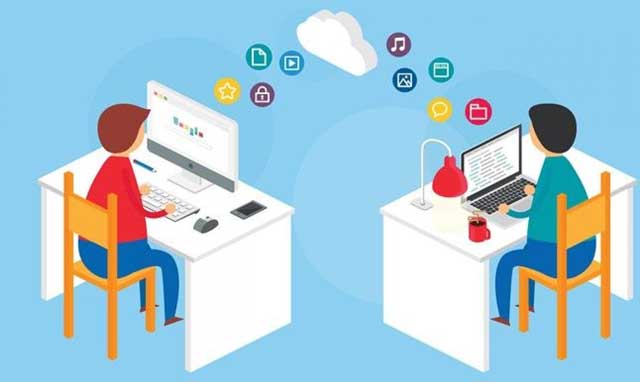
Kampala, Uganda | THE INDEPENDENT | Ugandans are embracing virtual collaboration to foster continuity of programmes amid a lockdown that affected the day to day lifestyles and routines in the world of work.
This follows a ban on public gatherings declared by the government as one of the measures to control the spread of coronavirus disease –COVID-19.
As a result, companies suspended key meetings and major conferences were cancelled, across the world as countries struggle to contain a disease which has affected more than one million people in a space of three months. But the unfortunate developments have now given rise to a new way of engagement- giving rise to virtual meetings and teleconferencing. Many Ugandans are now using zoom, Telegram GoToMeeting, and Skype, among others, to engage with colleagues from wherever they are, in the comfort of their homes, in offices, and even those on the move.
All one needs is a smartphone or a computer with active internet to launch a meeting. The tools have now been embraced by churches, government entities, Rotary groups, and a variety of organizations.
At All Saints’ Cathedral-Kampala, the Church is using the same arrangement to keep their daily prayer and fellowship sessions running, following a ban on church gatherings. Ivan Naijuka, an officer in charge of Media and Communication at the Cathedral says they generate a link referring the faithful to the webpage in addition to the meeting identity number and password which one fills in to be granted access.
Naijuka shares that the hosting administrator of the remote tool has to remain on alert to ensure that the sessions are not hijacked by people with a parallel intention. His argument rhymes with the fact that there has been a wide abuse of the tools in other countries.
Kampala International University-KIU Vice-Chancellor Dr Mouhamad Mpezamihigo shares that for a university, just as other institutions, meetings are a key component of their operations and decision making processes. He says that amidst social distancing guidelines, they opted for zoom meetings and the university conducted its first Virtual Senate meeting on March 26.
He says that the meeting which was geared at ensuring the continuity of University business went on smoothly as the senators forwarded motions and conducted business as if everyone was in the same room.
Zaitun Nalukwago, the communication and fundraising officer at Palliative Care Uganda-PCA says they are now using teleconferencing for different engagements including meetings and press conferences. She, however, observes that the system requires a strong internet connection to avoid disruptions. Other challenges cited include a lack of digital skills and technical knowledge among users.
The National Information and Technology Authority- NITA has now acquired over 10,000 zoom application licensees for the ‘critical’ staff in several government entities. Arnold Mangeni, the Director of Information Security at NITA says they have been piloting the virtual systems for applicability and safety and have already issued guidelines on how the government officials will use them to keep conducting their business during this lockdown.
“We have already identified the necessary equipment needed. Security has been a priority issue during the pilot and we have ensured that it will work. We have so far chosen zoom but we together with our consultants we are also accessing other software like TEAM from Microsoft,” he added.
By last week, over 81 government institutions including 40 districts had key officials registered and enabled to remotely video-conference in supporting government business continuity. They include the Office of the Prime Minister, the Office of the President, Ministry of Local Government, and Ministry of ICT and National Guidance.
This week, the government expanded the usage of Zoom licenses to support government continuity. In a letter dated April 6, 2020, the Permanent Secretary in the Ministry of ICT and National Guidance, Vincent Bagiire Waiswa, wrote to all Permanent Secretaries, CEOs and Accounting Officers in all ministries, departments and agencies (MDAs) of Government and Local Governments announcing remote working modalities for public officers.
Is this a Turning Point?
Nearly all those that have used the software’s have since predicted a new-dawn making the potential of having people either completely or partially working from their homes. Others also think that after the COVID-19 pandemic, several companies and institutions might completely formalize the use of the said tools.
Mangeni shares from the perspective of government entities. He says officials spend a lot of time in meetings which require them to meet somewhere thus foregoing service delivery to the clients. With the use of remote tools, one can stay in his or her office still attend a meeting or a conference.
“This is something NITA-U has for long been working on. We tried it out with several ministries sometime back and I think this crisis has given a face to such a project. There is no reason why a chief administrative officer from Karamoja travels to Kampala to attend a thirty-minutes or say two-hour meeting with a commissioner in Kampala,” observes Mangeni.
Michael Niyitegeka, an IT expert and member of the advisory group for the Government of Uganda on the 4th Industrial Revolution Technologies, agrees that the happening will have a great impact and is going to enlighten many who had refused to embrace such developments. He, however, gives a mixed reaction to explain why physical meetings might not be easily phased out after the pandemic.
Niyitegeka bases his argument on several factors including financial dynamics associated with the technology as well as the physical meeting, the quality of the internet in different parts of the country and levels of digital skills among Ugandans.
“Internet is still considered a luxury yet it is now a means of production. If we are to benefit from this, we need a lot of this done. The government should revise tax regimes on technology equipment, we have to ensure that we have stable, affordable and quality internet. Without those, we may get nothing out of this,” Niyitegeka told Uganda Radio Network.
********
URN
 The Independent Uganda: You get the Truth we Pay the Price
The Independent Uganda: You get the Truth we Pay the Price

